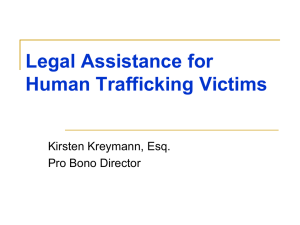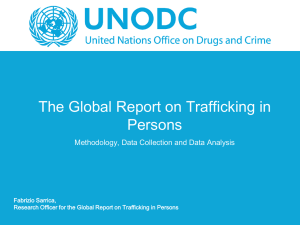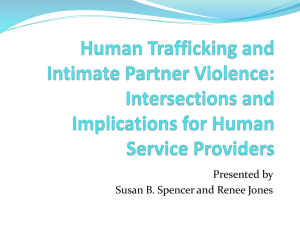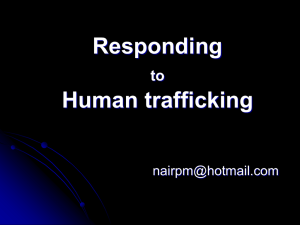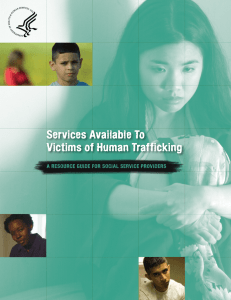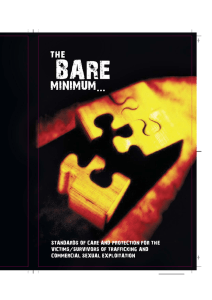INT_CAT_NHS_CYP_17062_E
advertisement
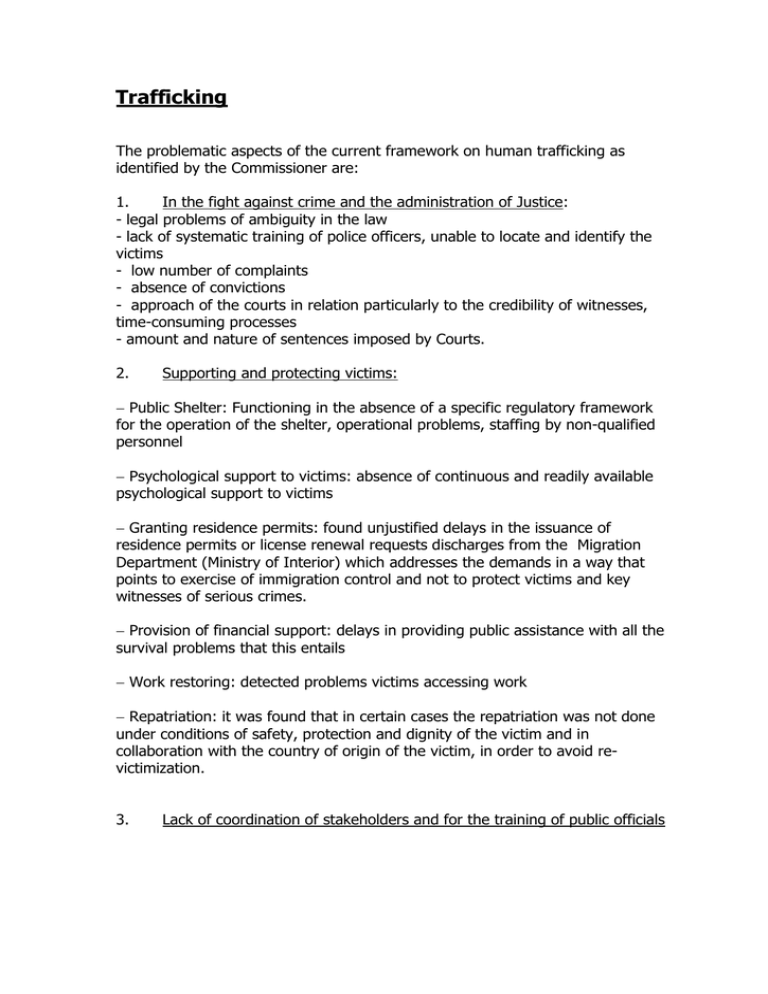
Trafficking The problematic aspects of the current framework on human trafficking as identified by the Commissioner are: 1. In the fight against crime and the administration of Justice: - legal problems of ambiguity in the law - lack of systematic training of police officers, unable to locate and identify the victims - low number of complaints - absence of convictions - approach of the courts in relation particularly to the credibility of witnesses, time-consuming processes - amount and nature of sentences imposed by Courts. 2. Supporting and protecting victims: Public Shelter: Functioning in the absence of a specific regulatory framework for the operation of the shelter, operational problems, staffing by non-qualified personnel Psychological support to victims: absence of continuous and readily available psychological support to victims Granting residence permits: found unjustified delays in the issuance of residence permits or license renewal requests discharges from the Migration Department (Ministry of Interior) which addresses the demands in a way that points to exercise of immigration control and not to protect victims and key witnesses of serious crimes. Provision of financial support: delays in providing public assistance with all the survival problems that this entails Work restoring: detected problems victims accessing work Repatriation: it was found that in certain cases the repatriation was not done under conditions of safety, protection and dignity of the victim and in collaboration with the country of origin of the victim, in order to avoid revictimization. 3. Lack of coordination of stakeholders and for the training of public officials 4. The use of NGOS experience and know-how has not been made to the maximum possible extent in the field of combating trafficking and support to the victims. In conclusion, the Commissioner made the following suggestions in the three main axes of prosecution, protection and prevention, as well as in some issues of cooperation and coordination: Criminal prosecution • Immediate harmonisation of Cypriot legislation with the provisions of Directive 2010/36/EU. • Introduction of more specialized methods and engaging experts in examination of witnesses during court proceedings. • Greater emphasis and more time in preparing and empowering witnesses • Priority to be given to cases of trafficking in persons before Courts • Upgrading of the legislative and regulatory framework in such a way as to include the gender perspective (gender mainstreaming). • To consider the prospect of signing and ratification of the Convention of Constantinople • Interdepartmental cooperation of the Police and Legal Service through the adoption of a code of practice to better prove trafficking in persons offences. • Intensify police training . • Internal upgrade of the Police Office for combating trafficking in persons, so that its actions to be more direct and effective. Protection • Disengagement from the crime management model and the strict adherence to exercise immigration control. • The status of victim of trafficking should take precedence over the status of immigrant. • In any case, the provisions for protection and assistance of victims of trafficking in persons should be independent from the prosecution of the crime. • Support for victims should be ongoing, personal, made by skilled persons and provides primarily the victims a sense of security and confidence. • Occupational rehabilitation is the first step to restore the victim's social life and a minimum "compensation", protocols of cooperation should be drafted and signed between the police, the Labour Department and the Social Welfare Services. • Continuous access to psychological support • Preparation of internal regulations of the Government shelter and written information to newcomers at the shelter for these regulations. • In cases of repatriation, when this qualifies as a better solution than that of residence in Cyprus, should be carried out in compliance with all the conditions of support, protection and security of the person. • Evaluation of police officers who handle cases of trafficking in persons Prevention • To intensify the training of members of the Government services that usually come into contact with potential victims, so as to understand their obligation, but also to increase their ability to recognize the signs of trafficking and to refer cases to the specialized Police Officer for Human Trafficking for further investigation. • Even more specialized training and training of decision-makers who manage the victims themselves • Potential criminalization of the purchase of sexual services. • Conduct an in-depth study of the legislative and institutional framework that regulates the entry and work of migrants in Cyprus, as to the compatibility with the efforts to identify and combat the practices of exploitation • As an immediate precautionary measure, to enhance awareness of persons arriving in Cyprus to work. • Substantial efforts for the law enforcement on the operation of private work agencies. Cooperation and coordination issues • Proceed directly to the institutional arrangement of the cooperation among government agencies with NGOs, through protocols. • Coordination of government agencies for purposes of implementation of the action plan and the effective assumption of responsibility for completing actions agreed by each service separately. The Ombudman’s Report was submitted to the Ministers of the Interior, Labor and Social Affairs and Justice and Public order, as well as in all public services and non-governmental organizations involved in the Multidisciplinary coordinating group for combating human trafficking. It was followed by a Public Roundtable on 18 November 2013, with all stakeholders, for the purposes of discussing the content of the Report and explore solutions to improve the framework and its implementation, with special reference to the two dominant, so far, forms of sexual and labor exploitation –and with the emphasis on prevention. Domestic Violence Problematic areas of the legal framework: - does not take sufficient account of the gender dimension - presents interpretative difficulties of the definitions set out in the law, both as to the kind of violence that is punishable, as well as groups of persons covered, - complaint rates are too low, - does not adequately meet the real needs of a victim, - there is poor implementation of relevant procedures by involved Officers and incomplete cooperation among related departments - Important aspects of the institutional framework provided for have not been carried out, and, in the case of non-existence of an official complaint by the victim or withdrawal the handling of the matter ends - there are gaps in welfare and protection for those persons who, although they are victims of violence, do not wishto submit a complaint, as well as for women who are third-country nationals and victims of domestic violence, - the possibility of guardianship sentence provided for the offender to attend treatment by specialists has not been sufficiently exploited - No determination of a single entity for collecting, recording and processing of incidents. On the basis of the above, the Commissioner proposed the ratification and implementation of the Istanbul Convention, which specifies proper and comprehensive policies and measures that should be followed in this field. At the same time pointed out that even without or and until the ratification of the Convention, the spirit of the Convention, as well as several of its forecasts in conjunction with the provisions of Directive 2012/29/EU on the protection of victims of crime, should be reflected in the actions and policies for the prevention and combat of domestic violence against women in Cyprus. Subsequently, made specific recommendations that can be applied to better address the complex issue, noting that for their implementation, as well as whatever else asked, her Office will be at the disposal of the services involved, and will continue even after the submission of the report to monitor the issue and the implementation of its recommendations without excluding for this purpose to invite the services to consultation or to set up a working group.


